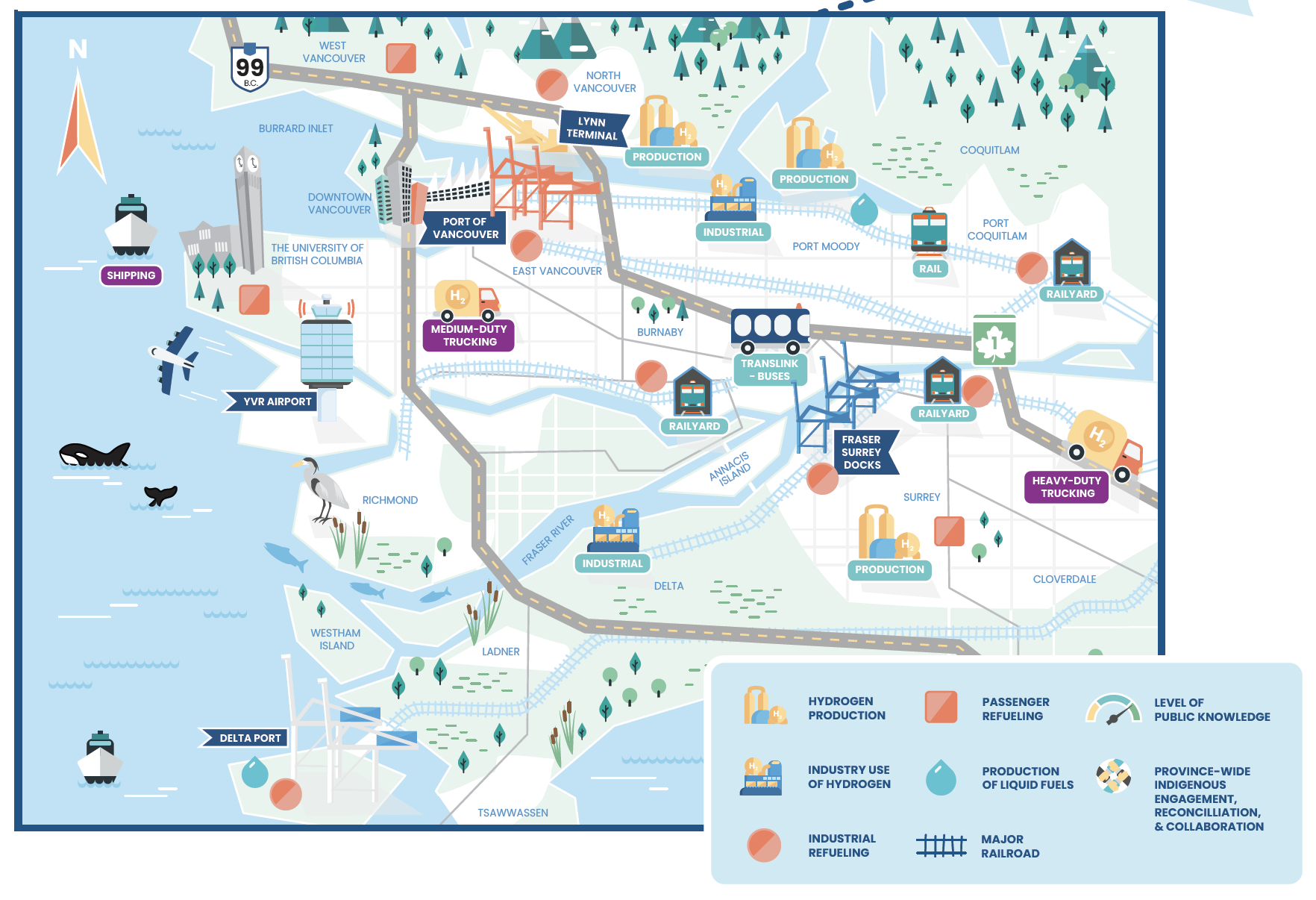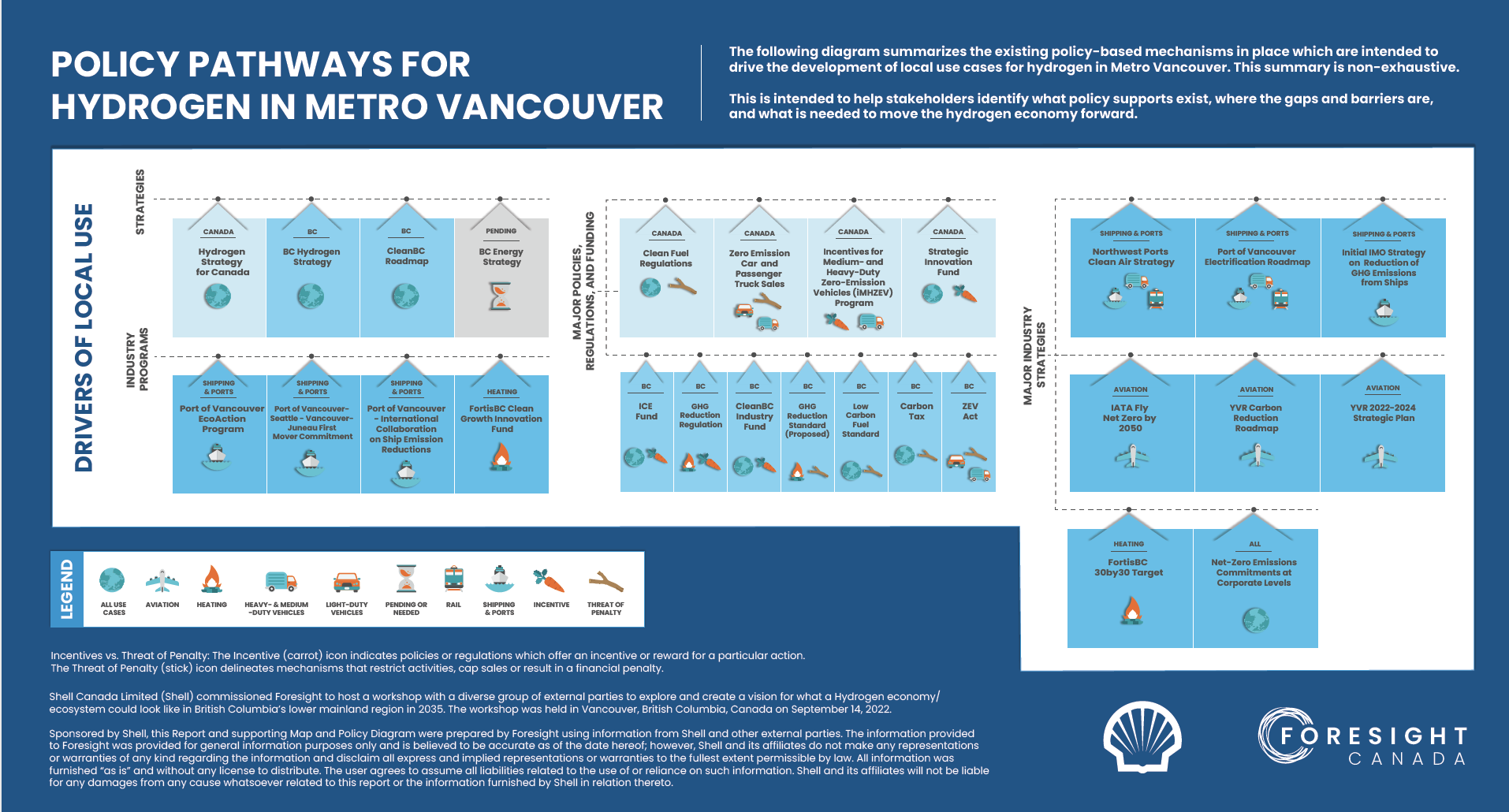This research project, commissioned by Shell Canada Limited (Shell), includes a detailed report, ecosystem vision diagram, and policy map to explore the future of Metro Vancouver’s low-carbon hydrogen ecosystem.
Executive Report Summary
To help reach the goal of being carbon neutral by 2050, government and industry stakeholders in Metro Vancouver are laying the framework for the development of a hydrogen economy.
Currently, 72% of the overall energy sources used in the Metro Vancouver region come from fossil fuels. These fossil fuels that are used in buildings, transportation, and industry are responsible for 90% of emissions in the region.
Multiple low-carbon energy sources, technologies, and innovations will be needed to meet regional climate goals, and in a number of these situations, hydrogen is an attractive option. Creating a hydrogen economy is a potentially advantageous opportunity for Metro Vancouver for a variety of reasons:
- Renewable Power: BC’s hydroelectric dams are a consistent source of renewable power generation, which is advantageous for electrolytic hydrogen production.
- Location: Metro Vancouver is strategically located on Canada’s southwestern coast and home to the largest port in Canada which facilitates major trade routes to Asia and the west coast of North and South America.
- Policy Landscape: Local and provincial governments in BC have shown strong political support for hydrogen, including establishing the BC Hydrogen Strategy, CleanBC Roadmap, legislation such as the Low Carbon Fuel Standard, and the BC Energy Regulator. Alongside the federal government’s support of hydrogen, this creates a favourable policy landscape at all levels of government.
- Hydrogen Cluster: There is already an established hydrogen cluster in the region with promising growth potential, including large industry leaders like Ballard Power Systems, multiple start-ups with innovative technologies, hydrogen-focused academic research, investor knowledge, government support, and technological development.
We invited innovators, industry, academia, government, and Indigenous communities to come together and vision what a future hydrogen ecosystem in the Metro Vancouver region could look like in 2035.
Painting the Full Picture
We also mapped out a visual summary of the existing policy-based mechanisms in place which are intended to drive the development of local use cases for hydrogen in Metro Vancouver.
Our research shows that the hydrogen policy framework in BC is more robust than in many other geographies, indicating strong government support for developing a local economy. Though policy mechanisms in place are supporting the growth of Metro Vancouver’s hydrogen sector, the future hydrogen economy will not exist in a silo. Understanding the development of policies and strategies related to hydrogen in key jurisdictions and how they may impact Metro Vancouver will help create a future vision for the sector.
The report goes into detail about the developing hydrogen policy ecosystems in BC, within Canada, and in key international trade or partner regions:
- Canada
- Alberta
- Saskatchewan
- United States
- Washington
- Oregon
- California
- Australia
- Chile
- Japan
- South Korea
Decarbonization is a complex undertaking, and the distribution and proportion of low-carbon energy that will become prevalent in the Metro Vancouver region is hard to predict.
Continuing to paint the picture of the future hydrogen ecosystem will help stakeholders identify what supports exist, where the gaps and barriers are, and what is needed to move the hydrogen economy forward, laying the foundation to get us to an ideal hydrogen economy.
Building a Clean Hydrogen Economy Starts Here
Discover key insights, market opportunities, and the latest advancements in hydrogen innovation.




